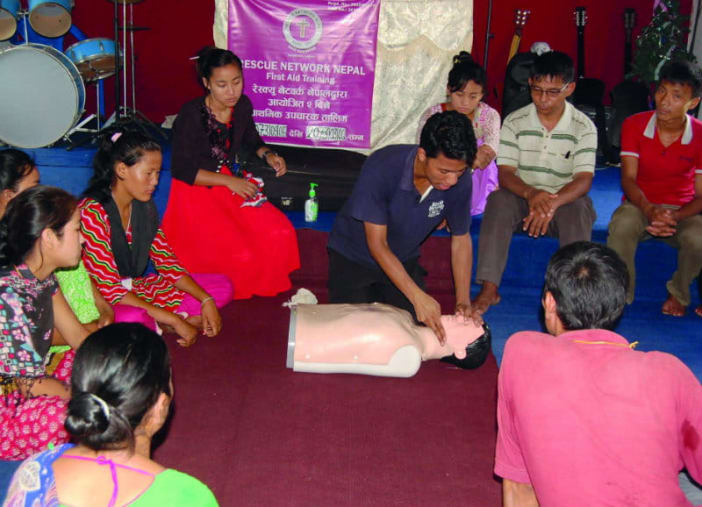by Neil McDonald.
DENTAL Means 'of the teeth
ORAL Means 'of the mouth'
Nepal is one of the world’s ten poorest countries, with just $6 available from the government budget to provide healthcare for each person every year. The treatment of infectious diseases of the chest and bowels swallows all of this money. Who cares about teeth?
Our studies show that the rapid urbanisation taking place in most Third World countries produces more tooth decay because sugar-containing foods such as biscuits and carbonated drinks are so easily available.
In industrialised countries the traditional approach is to ‘go to the dentist’ when things go wrong. In Nepal 100 dentists serve 24 million people. What chance is there of finding dental care when you have serious toothache? If you live in Kathmandu, the capital, you may be lucky since 92 of the dentists work there, serving one million of the population. That leaves just eight dentists to care for the remaining 23 million…
The United Mission to Nepal Oral Health Programme (OHP) has developed a unique approach to addressing Nepal’s oral health needs by developing an ‘upstream’, ‘midstream’ and ‘downstream’ influence:
Upstream
(Research, networking and publishing to encourage policy changes)
- Studying the levels of dental disease in both rural and urban school children has given us a baseline for our work policy.
- Extensive studies have been made of Nepal’s drinking water over the last three years to determine the natural fluoride content (fluoride strengthens teeth and cuts dental decay by half). We discovered that only two out of 600 locations examined had naturally occurring recommended levels. Therefore…
- Local toothpaste companies and the Nepal Dental Association have been lobbied with the results of our research and have been encouraged to put the recommended fluoride levels in low cost toothpaste instead. A major multinational manufacturer has now responded. This public health measure will have more effect on dental decay than any other aspect of our work.
Relevant information has been widely published to inform the government, the dental profession and the public of the current situation.
Midstream
(Preventive dental healthcare)
Rural government healthposts are ideal sites for delivering appropriate dental healthcare at village level. The government paramedics who run these posts have now received ‘top-up’ training in disease prevention and simple pain relief. School visits are included and children are encouraged to check each other’s mouths. Trainees are visited regularly by their trainers and given on the- job refresher courses.
Literature with pictures is produced in the Nepali language. These ‘flashcards’ and posters are aimed at schoolteachers, parents and other adults in non-formal education classes who will use the information to teach children. The main subjects we cover include:
prevention of dental decay and gum disease through:
- good nutrition (including breastfeeding young children)
- regular brushing of teeth with a fluoride toothpaste.
prevention of oral cancer (South Asia has the highest rate in the world) through encouraging people to avoid or reduce their use of:
- smoking
- chewing tobacco – especially when combined with drinking alcohol
- chewing pan (a mixture of areca nut, lime, chewable tobacco and masala wrapped in a green betel leaf).
Downstream
(Curative care)
- All of our staff are either dentists or dental therapists. Wherever we work we always offer pain relief care to those in need. This particularly applies to schoolchildren who often have no opportunity to get help for their painful dental problems. Practical care also builds up more faith in our work with teachers, parents and villagers, who see that we use action as well as words. They are then likely to be helpful when we plan further visits to their community.
- People with more serious problems, who may need surgery or tooth repairs, are referred to one of our hospital dental departments where good care is available at modest cost.
As the ‘upstream’ and ‘midstream’ efforts begin to have their effect, the ‘downstream’ work should ideally become a safety net only and not the main focus. In practice, this is a long-term strategy with the aim of helping people take charge of their oral health condition. Our emphasis is heavily biased towards preventing dental disease.
Comments received during training sessions
‘I want to care for my patients and give them the best I can. This training has shown that somebody cares for me as well. Thank you!’
‘The people I serve make great demands on me each day. I’m not a doctor, just a rural paramedic. I feel better because I can help them with my new dental skills’.
‘Please can I come back in six months for a refresher course?’
‘I now plan to run a dental session each Tuesday morning in my healthpost.’
Neil McDonald has been the Director of the Oral Health Programme of the United Mission to Nepal for three years. This programme is supported by Tearfund. Neil has also worked for a number of years in Kenya and UK as a dentist. His address is: c/o UMN, PO Box 126, Kathmandu, Nepal.
Fax: + 977 1 225559 E-mail: [email protected]







